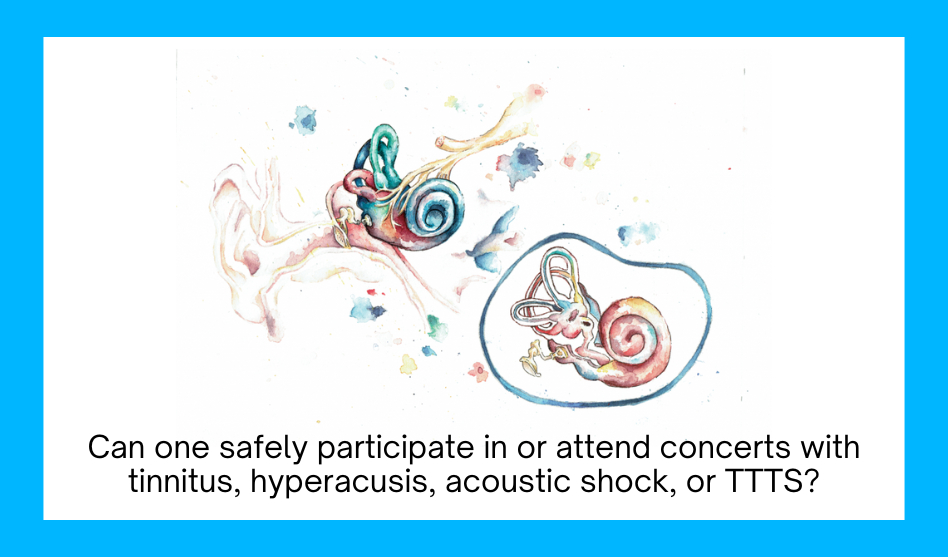Question from a member of our community:
My question is can one safely participate in choir orchestra, go to concerts or movies when they have tinnitus, hyperacusis, acoustic shock, or tonic tensor tympani syndrome, also referred to as TTTS?
So my first answer is I absolutely recommend that you safely participate in choirs, in music, in concerts, in orchestras, especially when it’s coming from a place of joy and engagement and loving connecting to your communities and enjoying being surrounded in that music and that sound scape. So sensory enrichment and reintroducing sounds that bring us pleasure and joy is hugely therapeutic for anyone with tinnitus. And for those of you with acoustic shock, hyperacusis, or TTTS, I think it’s absolutely recommended for you too. It’s beautiful to allow yourself to enjoy being flooded by these beautiful sounds that you are choosing to participate in.
But what I would say is pace yourself. Give yourself options to perhaps attend for five or 10 minutes and leave again. What else could you do? Give yourself opt outs, maybe take breaks so you might not want to be there the whole time. You might want to step in and out. You might want to bring a friend with you and let them know, “Hey, I’m very sensitive to loud sounds or even normal sounds. It really hurts my ears. I get stressed.” So what I would say if you’re feeling the anxiety, particularly with acoustic shock, hyperacusis, and TTTS, but honestly this is really relevant for tinnitus folks too because there’s an anxiety component of caring so much about ourselves and our hearing health that we don’t want to make it worse.
So what I would say is be resourced, have your self soothing tools. If you’ve got the Rock Steady program, look through the tools that are provided there that help you ground, that help you reclaim your safety, that help you self regulate, that help you find your steadiness and your center and use those tools before you go to the choir or the concert or the movies, use them while you’re in the movie or in the choir or in the concert and know when you’re feeling like you’ve had enough. You don’t have to get to the point of overwhelm and you don’t have to stay there. You have agency and choice. This is your body. You choose how much exposure you enjoy and feel safe for you in that day. And so because we’re building up, we’re teaching the brain that, “Oh, choir is safe,” and we’re teaching the brain the movies are safe, we need to build that trust. The brain’s learning, the brain’s going, “Oh, I’m not sure about this. This could hurt me.”
So especially around your tension, any tension around the head, shoulders, and neck, you want to have some strategies to release that muscular tension. I actually went to the movies recently and, being an audiologist, I had my watch measuring the decibel readings and I was feeling particularly sensitive that day and I was like, “This is really loud.” So I measured the volume and it was way over safe hearing levels. The audiologist in me was so angry that they would expose public to such loud sounds and I actually did go to complain and say, “This is not safe volume levels, I’m measuring it.” And anyway, so I think there is a little bit of public education to happen. So sometimes back yourself. It may be too loud and it is dangerously too loud.
But what happened was I went back in, I asked them to turn it down and whether they did or not was not in my control, but I went back into the movie and I was using my strategies. I was sometimes closing my eyes just to relieve some of the sensory input to my brain. I was body scanning. I was noticing if there was nervous tension or anxiety building up and I was meeting that with kindness and resolving it in real time. So it’s a little bit of if you don’t feel up for it, it’s okay to avoid it. You don’t have to expose yourself aggressively. You pace what you feel ready for. It’s all about remembering to connect into pleasure and joy because that’s what’s going to teach the brain and the ears that those sound pathways are healthy. They’re safe. They’re fine. From a physiological point of view, we want the signals coming from the sound collection in the ears that travels to the brain, we want the brain to tick all of those off as safe, healthy, and enjoyable.
And what has been happening in the past is when we hear sounds, we’re associating it with pain and with tinnitus and with unwanted abnormal outcomes so the brain’s being vigilant and responding to it in more of a stressor way. So that’s what we’re doing is we’re teaching those sounds to come over into the brain as safe and pleasurable. And that could take time, it might be instant. Some of you will hear this, go straight to choir and just have fun. And for others of you, it will be a slow, incremental practice of learning to release that anxiety, self soothe, and re-expose your body and your ears and your brain, choose sounds in a really healthy way. And of course, I think as per the movie example, just note, if it feels too loud for you, it actually might be too loud for you. So just be really realistic and listen to your body because you know you best.

